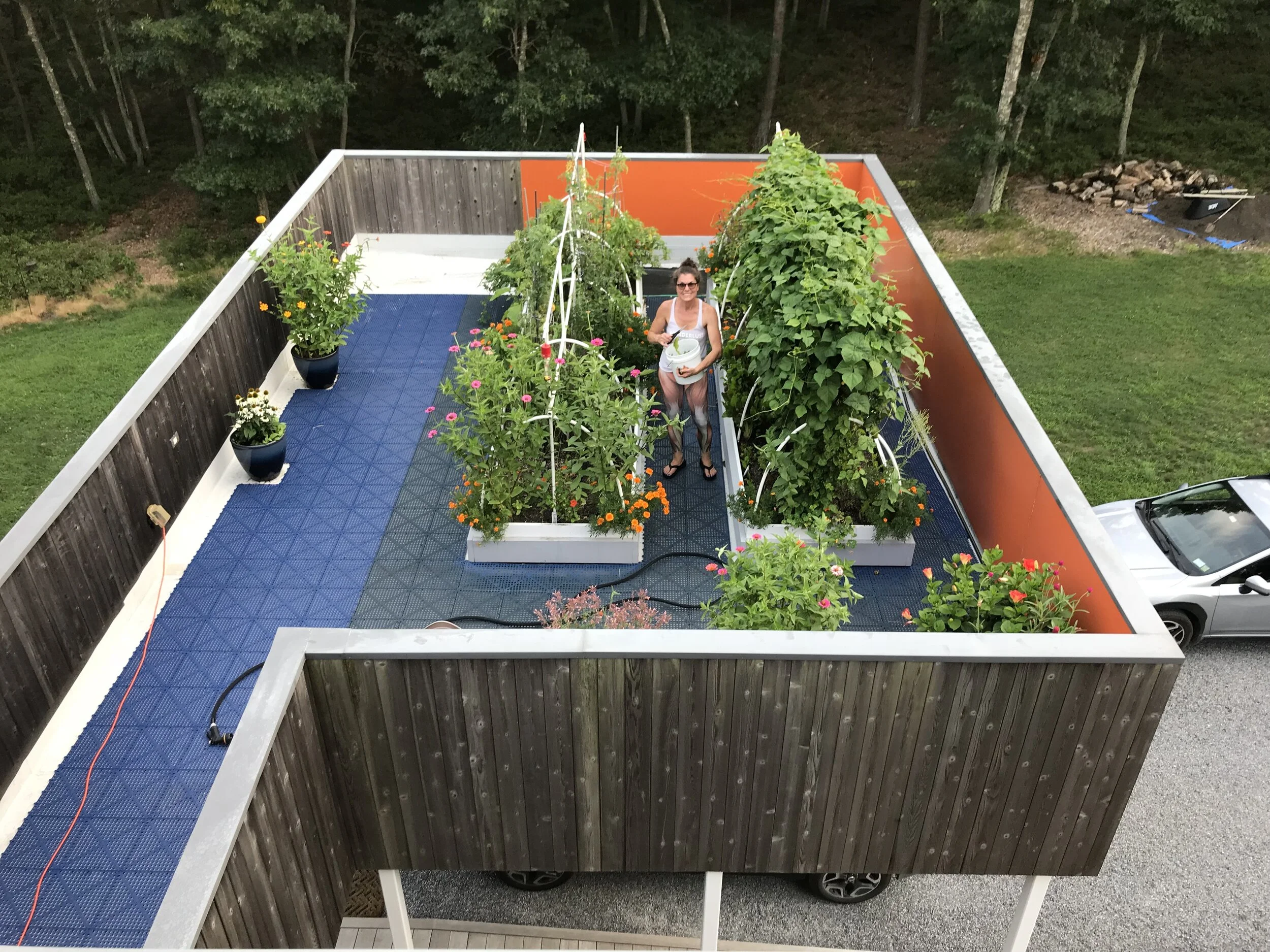Chikapalooza - The Basics of Raising Chickens
/The Garden of Eve's first Chikapalooza was a great way to kick-off Earth Day and to celebrate spring. Throughout the weekend there were cooking demonstrations and information about their Community Supported Agriculture (CSA) as well as workshops for creating an organic home garden, shearing wool, working with bees, and the highlight of my visit, raising chickens.
At a very young age birds have always been a part of my life. My father raised a hundred or so canaries that started out in the basement of our house and eventually made its way to the outdoor shed. At the crack of dawn, just when the sun peeked it's way through the window, the canaries would sing the longest and most beautiful melody you have ever heard. My father always had an affinity for birds, and even tried a hand at raising chickens for eggs years ago, until the town put a stop to his love affair. Thankfully, the Chicken Laws and Ordinances have evolved since then.
Four years ago, when my husband Chris and I bought our 1.1 acre lot in Hampton Bays, New York my father's first thought was, "Chickens, you can raise chickens!" Our first thought, "We need to build a house."
We are 3.5 months away from Sheridan Green being complete and all I can think about is raising chickens for eggs. We have not picked out our kitchen appliances yet and I'm fantasizing about the design of our chicken coop and the young Araucanas, Bantams and Top Hats frolicking around our property.
While Chris was busy being Architect and General Contractor for Sheridan Green, I was on my way to Chikapalooza, to understand the basics of raising chickens.
Dr. Mark Bridgen, Professor and Director of the Long Island Horticultural Research and Extension Center at Cornell University led the seminar. He has been raising his own chickens for more than 25 years and is an authority on the care and management of chickens in the home.
Here are some of my top takeaways from the seminar:
- How to begin? First research your Chicken Laws and Ordinances. It is important to understand your zoning restrictions and to think about your neighbors.
- What kind of chickens should you get? There are different chicken breeds for meat, eggs, pets and show birds. Determine your purpose for chickens and then pick your breeds. Starting with baby chicks ensures a "cleaner" flock from potential diseases and easier adaptation to you and their new environment.
- Where to get Chickens? You can mail order chicks from Cackle Hatchery and Murray McMurray Hatchery. During the springtime you can get chicks at your local feed stores. Locally for Long Island residents you can call Long Island Hatchery at 631.457.0612.
- What to do when baby chicks arrive? It is best to be prepared before your chicks arrive. You'll need a chick brooder and flooring of pine shavings. The easiest way to make sure your chicks stay warm is to provide them with a heat lamp indoors at a temperature of 90 to 100 degrees for the first week from a single lamp. Decrease 5 degrees per week until the chick is 4 weeks old. Special feed of "crumbles" or "mash" and fresh water is imperative.
- Do you need a rooster to get eggs? No. You would only need a rooster if you want to raise your own chicks. If you want a rooster you need to be considerate of your neighbors as they are extremely loud.
- Where to keep Chickens? In a chicken coop; general rule 2 or 3-square-feet for each chicken. A sturdy, well ventilated and protected structure which is raised off the ground is best to keep predators from getting in. One nesting box for every 2-3 hens. Chickens need exercise, fresh air and room to roam safely. If you are fencing in a chicken run which is attached to your coop each chicken needs approximately 4-square-feet.
- What to feed Chickens? Adults get vegetarian, no-antibiotic feed which you can get at any Agway (NOT their normal Agway brand feed - which has antibiotics and animal by products in it). Locally for Long Island residents: Neptune Feed, 631.369.0965 and East Port Feed, 10 bag-pellet quantities only. 631.325.0077. Chickens will eat your vegetable scraps/compost, lawn clippings, bugs, ticks and worms. Fresh water daily is a must.
- How many eggs will you get? 200-300 eggs per year per chicken. Hens naturally lay eggs when the days are long, and slow down as the days grow short in the wintertime. If you want your hens to lay eggs throughout the winter add a 40-watt bulb for 100-square-feet (10- by 10-foot) or 60-watt bulb for 200-square-feet (20- by 20-foot) suspended about 7 feet off the floor to substitute for daylight.
- Common Chicken Predators: Cats, Dogs, Foxes, Hawks, Owls, Raccoons and Rats. The chickens will naturally go into their coop at dusk and you must lock the chickens in so no predators can enter the coop. Put sturdy wire metal screens on all of your chicken house windows and use a good grade wire with small openings. Instead of letting the chickens roam freely, build a wire-enclosed chicken run next to your coop and make sure to put a top on it.
- Why would you want to raise chickens? fun, easy, fresh eggs and pet-friendly.
After the seminar, I went to see how the Garden of Eve pastures their 1,500 chickens in their custom-built "eggmobiles" that are out in the fields, and moved every 3 weeks to new "pasture". Pastured poultry is a sustainable agriculture technique that calls for the raising of laying chickens on pasture, as opposed to indoor confinement. They eat grass, just like a cow, in addition to their no-antibiotic, all vegetarian grain pelleted feed and bugs within the field. Pastured chicken eggs have alot more flavor than store-bought. The yolk is bright orange and higher in Omega-3's due to the chlorophyll in the greens the chickens eat.
North Fork Hen House Tour
For those of you who are looking to create your own hen house or simply curious about chicken coops in general, there will be a self-guided tour of the North Fork Hen Houses on Saturday, June 15, 2013 from 10–3 p.m. This is organized by Cornell University's Long Island Horticultural Research and Extension Center, to celebrate hometown hen houses, and to share enthusiasm for raising chickens.
Some of the stops on the tour include: a small family-run farm that sells eggs and chickens all year, a supplier of baby chicks, a perennial plant grower that has ducks, geese, and chickens, a homemade hen house with a green roof and families who raise chickens for fresh eggs and more.
Participants will pick up their maps at Cornell University's Long Island Horticultural Research and Extension Center at 3059 Sound Avenue, Riverhead, New York 11901. There will be a $5 fee per vehicle to obtain a map.
If you have a hen house that you are especially proud of and are willing to be one of the sites on the tour, please call Dr. Mark Bridgen at: 631.727.3595 or e-mail: mpb27@cornell.edu.
Did you know?
That Suffolk County is the most Agricultural county in the State of New York based on wholesale value. No other county in New York is more important or more diverse.
To visit the Garden of Eve Organic Farm & Market: 4558 Sound Ave, Riverhead New York 11901 www.GardenOfEveFarm.com phone: 631.722.8777.































